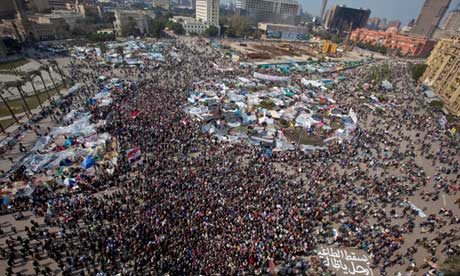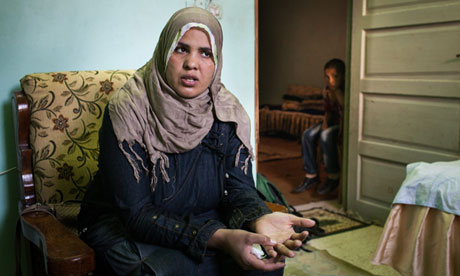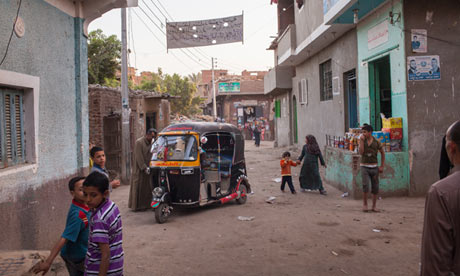Egypt's army took part in torture and killings during revolution, report shows
Leaked document shines light on crimes including forced disappearances during uprising against Hosni Mubarak
guardian.co.uk, <time itemprop="datePublished" datetime="2013-04-10T11:23BST" pubdate="" style="padding: 0px; margin: 0px; border-collapse: collapse; background-repeat: no-repeat no-repeat;">Wednesday 10 April 2013 11.23 BST</time>

Egyptian protesters in Cairo's Tahrir Square in February 2011 during demonstrations against the then president, Hosni Mubarak. Photograph: Sean Smith/The Guardian
Egypt's armed forces participated in forced disappearances, torture and killings across the country – including in the Egyptian Museum – during the 2011 uprising, even as military leaders publicly declared their neutrality, according to a leaked presidential fact-finding report on revolution-era crimes.
The report, submitted to the president, Mohamed Morsi, by his own hand-picked committee in January, has yet to be made public, but a chapter obtained by the Guardian implicates the military in a catalogue of crimes against civilians, beginning with their first deployment to the streets. The chapter recommends that the government investigate the highest ranks of the armed forces to determine who was responsible.
More than 1,000 people, including many prisoners, are said to have gone missing during the 18 days of the revolt. Scores turned up in Egypt's morgues, shot or bearing signs of torture. Many have simply disappeared, leaving behind desperate families who hope, at best, that their loved ones are serving prison sentences that the government does not acknowledge.
The findings of the high-level investigation, implicating Egypt's powerful and secretive military, will put pressure on Morsi, who assumed power from the Supreme Council of the Armed Forces after his election last June and has declined to prosecute any officers, despite allegations that some participated in abuse. They could also figure in the retrial of the toppled president Hosni Mubarak and his former interior minister Habib el-Adly, who are set to return to court on Saturday to face charges – perhaps supported by new evidence from the fact-finding committee – that they were responsible for killing protesters during the revolt.
"This chapter sheds light on new and extremely disturbing incidents that implicate the military in serious human rights violations," said Hossam Bahgat, the director of the Egyptian Initiative for Personal Rights. "In particular, it uncovers new details on one of the most secret aspects of the 18 days of revolt that ended with the ouster of Mubarak: the role played by the armed forces in supporting Mubarak against protesters from the date they were deployed on 28 January 2011, until the first military statement was issued in support of the protesters on 10 February."

Radia Atta, whose husband disappeared after being held at a military roadblock south of Cairo. Photograph: David Degner
Among the incidents explored in the chapter, which focuses on the fate of those who went missing or were forcibly disappeared, investigators found that members of the armed forces detained an unknown but likely large number of civilians at a checkpoint along a highway south of Cairo who have never been seen again; detained and tortured protesters in the Egyptian Museum before moving them to military prisons, killing at least one person; and delivered to government coroners in the capital at least 11 unidentified bodies, believed to be former prisoners, who were buried in indigent graves four months later.
"The committee found that a number of citizens died during their detention by the armed forces and that they were buried in indigent graves, as they were considered unidentified," the report states, adding that authorities did not investigate, despite evidence of injuries and severe torture.
"The committee recommends investigating the leaders of the armed forces about the issuance of orders and instructions to subordinates who committed acts of torture and enforced disappearance," it states.
One woman who gave testimony to the committee, Radia Atta, told the Guardian that her husband, Ayman Issa, disappeared after being held at a military roadblock on a major desert highway south of Cairo, near the pyramids of Dahshour. He was on his way to work on 30 January 2011, after leaving their home in Ashment, a rural village in the governorate of Beni Suef. Issa was probably arrested some time between 7.30am and 8am, Atta said, during a curfew set by the military.
When Atta arrived at the checkpoint that afternoon, after receiving a call from a neighbour who saw Issa being arrested, she said she saw a staggering number of detained civilians lying on the ground with their hands and feet bound. Officers at the checkpoint sent Atta to a police station in Giza, the capital's western district, that had been commandeered by the military.
There, Atta saw soldiers frisking and beating detainees as they arrived from the checkpoint. One soldier handed Atta her husband's passport and said he had been charged with "rioting" against the army and referred to military prosecutors.
When Atta obtained permission from the prosecutors to visit her husband in Hykestep, a large military base with a prison on Cairo's eastern outskirts, he could not be found. Her complaints to the defence ministry, interior ministry, and civilian and military prosecutors have failed to turn up any trace of her husband.
The military declined to comment on the report, saying it could take up to three weeks to respond. A source at the president's office said Morsi had not seen the findings, which were being investigated by the prosecutor general. "As soon as results appear, they will be made public," the source said. "The findings you mentioned are speculative, and not authentic. We haven't received the findings from the committee, and the investigations are still ongoing."
Protesters and opposition politicians have long called for the military to be held accountable for scores of alleged incidents of torture and killingsduring the uprising and 16 months of military rule that followed. The military has prosecuted at least four people, including three low-level conscripts, for incidents that occurred later in 2011, but no member of the armed forces is known to have faced charges for abuse or killings during the revolution. Human rights lawyers say Egypt's new constitution, which was passed with Morsi's urging in December and gives the military sole authority to investigate its own members, made prosecuting soldiers impossible.
The constitution is "a bar forever", said Heba Morayef, the Egypt director for Human Rights Watch. "We've been arguing from the start that there will never be military accountability within the military judiciary. It's just never going to happen in Egypt," she said. The 16-member fact-finding committee, appointed by Morsi last July, investigated 19 violent incidents and submitted a roughly 800-page report to Morsi and the prosecutor general, Talaat Abdallah, but neither has released or publicly responded to the report's findings and recommendations.

Dahshour, Egypt, the village near where Ayman Issa was stopped before he went missing. Photograph: David Degner
Despite calls from some human rights lawyers, including the committee member Ahmed Ragheb, to form a special authority that could have prosecuted crimes committed by both civil and military authorities, no new charges have been filed. An office under Abdallah for the "revolution protection prosecution", approved by Morsi in November, says it is investigating new cases, but it will not be able to charge military officers.
"The committee reached important findings, but unfortunately Morsi didn't do his role in declaring the report to the public opinion and did not take serious steps with the security apparatus that was involved in crimes against demonstrators," Ragheb said.
Egypt has not created a national database to track those who disappeared and has not established a ministry to assist their families, as Libya did after its revolution. The National Council for Care of the Revolution Martyrs' Families and Wounded, established in December 2011, claims to have paid out millions of pounds in compensation but does not track missing people.
Disappearances are particularly difficult to investigate, human rights activists say. Egyptian authorities may intentionally fail to keep records, and ordinary missing-person cases can be impossible to distinguish from forced disappearances at the hands of security forces.
Mohsen Bahnasy, a human rights lawyer and member of the fact-finding committee, said the military and interior ministry had refused to provide the names of soldiers or officers working at checkpoints, police stations and ad-hoc detention centres where civilians disappeared. The failure to turn over the names "is in itself an indication of a criminal cover-up", Bahgat said.
Bahnasy said he intends to sue the armed forces and the government to compel them to reveal the officers' names and a definitive list of who they arrested. Bahnasy and others say they cannot reliably estimate how many people disappeared during the revolt. Nermeen Yousry, who in 2012 helped found an independent advocacy campaign for the disappeared called.
We Will Find Them, said Egypt's military-appointed cabinet reported in March 2011 that 1,200 missing-person cases had been filed during the revolution. The fact-finding committee, after collecting witness statements, testimonies from relatives of the disappeared, and data turned over by Cairo prosecutors and the Forensic Medical Authority, could only confirm 68 disappearances. Bahnasy said he believes there are hundreds more.
"This is a very small number, of course. The real numbers are much higher," said Hassan el-Azhari, a lawyer with the Association for Freedom of Thought and Expression, who has also filed a case to force the government to turn over the names of those arrested.
The military, interior ministry and General Intelligence Service – Egypt's top spy agency – did not provide the committee with any information about civilians who may have been detained without identification, and Bahnasy said many families of the disappeared did not come forward. But evidence compiled by the committee points to a wave of arrests, torture and deaths.
In addition to at least four civilians, though probably many more, who disappeared after being detained at the roadblock near the Dahshour pyramids, the committee also compiled evidence that the military detained protesters in and around Tahrir Square and transferred them to military prisons during the revolt. Investigators found that armed military intelligence officers with cameras booked rooms in a major hotel adjacent to the square on 25 January, the first day of protests, and observed and recorded subsequent events, Bahnasy said.
"Military intelligence had evidence of what happened and hid them from the committee and the judiciary," he said. The committee found evidence that at least one protester who disappeared from Tahrir Square during the revolt and was later found dead – a young lawyer from the governorate of Monofeya, around 45 miles (75km) north of Cairo – was detained and tortured by the military.
Osama Abdel Hamid travelled to Cairo with colleagues from his local lawyers syndicate on 1 February 2011 to participate in the protests, his father told the committee. Karim el-Gharbali, a friend who joined Abdel Hamid in the square, told investigators that the lawyer was fluent in English and helped foreign journalists translate painted banners and shouted slogans.
Some time after the 2 February assault on the square by Mubarak loyalists that came to be known as the Camel Battle, Abdel Hamid was abducted by men in civilian clothes and detained in the basement of the nearby Egyptian Museum, Gharbali said.
Another witness, Hani el-Azab, told the committee that he and Abdel Hamid were taken in armoured military vehicles to the museum at around 6am on 3 February and were tortured and photographed with weapons and money. Before dawn on 4 February, Azab said, he and Abdel Hamid were transferred to a military prison operated by a unit he identified as Military Intelligence Group 75, where they were tortured and forced to confess to crimes. Finally, Azab said, the two were moved and held for three days in Hykestep, where Abdel Hamid died from the torture and beatings.
Abdel Hamid's father, Abdel Moneim Allam, found his son's body 12 days later, after receiving a tip from a lawyer who said it was being stored in Cairo's Zeinhom morgue. It was "misshapen" by torture, bore signs of beatings, and had a fractured skull, he told the committee.
Bahnasy and Azhari said that the hundreds of people who they believe disappeared during the uprising were probably killed. In addition to protesters who vanished and civilians who were arrested from the streets, thousands of prisoners remain lost, and the two lawyers believe many of them are dead.
Little is known about the violent events that wracked Egypt's prisons in the days following 28 January, when the police fled their posts. According to the interior ministry, about 24,000 prisoners escaped, and 21,000 have since been re-arrested. Taqadum el-Khatib, a political activist who worked with the fact-finding committee, has said that several prisons came under co-ordinated attacks by unidentified men and that guards used teargas and live ammunition in failed attempts to repel the assaults and subdue rioting prisoners.
Other reports alleged that security forces may have intentionally allowed prisoners to escape from certain prisons, while guards at other facilities opened fire and killed dozens of inmates who rioted when they heard that prisons were being opened. Witnesses claimed that during the chaos, some prisoners were left abandoned and locked inside, while others who escaped were later arrested by security forces and disappeared.
In February 2011, Amnesty International found that inmates who were released from Fayoum prison on 28 January and detained on 30 January at the Dahshour checkpoint were later found dead. Officers told two men whose brothers were among the detained that they could inquire at the interior ministry about where their relatives would be taken. Instead, the men found their brothers' corpses, bearing signs of torture, nine days later in a Cairo morgue alongside 68 other bodies identified as Fayoum prison inmates.
According to data provided to the fact-finding committee by the prosecutor general's office, the Forensic Medical Authority officially recovered 19 unclaimed bodies during the revolution, 11 of whom had been delivered to coroners by military prosecutors, and 10 of whom were identified as inmates from Fayoum prison. All were turned over between 2 and 8 February.
Other disappearances detailed in the committee's report remain harder to explain. Sabah Abdel Fattah, the mother of 26-year-old Mohamed Seddik, told the Guardian that her son, a member of the opposition Dignity party, disappeared after leaving home to protest on 28 January. On 11 February, the day Mubarak resigned, Seddik texted his cousins, saying: "Talk to me." When Abdel Fattah reached him on his mobile phone, Seddik was surrounded by voices and car horns, as if in a crowded vehicle.
"Yes mum, I'm mo …" he said, before the line cut. Abdel Fattah believes he was either saying his name, Mohamed, or "mahbous", the Arabic word for arrested. When Abdel Fattah reached Seddik's phone later that night, a man answered and swore at her.
No one answered for another three months, when finally another man picked up and said he had bought the line. A month later, a third man answered and explained that his brother, a soldier in the army, had found the sim card near el-Gabal el-Ahmar, or Red Mountain, a well-known riot police camp in Cairo. When Abdel Fattah visited the Red Mountain area, residents told her that prisoners had been held in the camp during the revolution but had been released.
Azhari says that a number of families who continued to call their disappeared relatives' phones were answered by neighbourhood residents who said they found the sim cards in piles of rubbish outside Red Mountain.
Abdel Fattah said she thought the military had secretly detained civilians during the revolution, some of whom had been sentenced. She claims to have been told by family friends in the intelligence services that her son was given a three-year sentence and is probably in a military prison. Morayef and other human rights advocates say such a scenario is highly unlikely, since the thousands of civilians known to have been brought before military trials since 2011 are transferred to civilian prisons after their case is decided and usually can contact their families.
Abdel Fattah believes her son will return to the family's apartment, down an unpaved back alley in Cairo's Zeitoun district, where his framed portrait sits on top of a bookshelf, when he completes his sentence. Human rights lawyers say most will never return.
Yousry, of We Will Find Them, said the security forces had tried to disappear those who died in their custody "to make it harder for the families to ever find their kids, so they don't convict themselves".
"Actually me, myself, I used to chant: 'The army and the people are one hand,' but now, yes, maybe we will realise that the army was never on our side," Yousry said. "I guess they were trying to break down the revolution. They wanted to contain it and make people scared, terrify people from going to the square."
